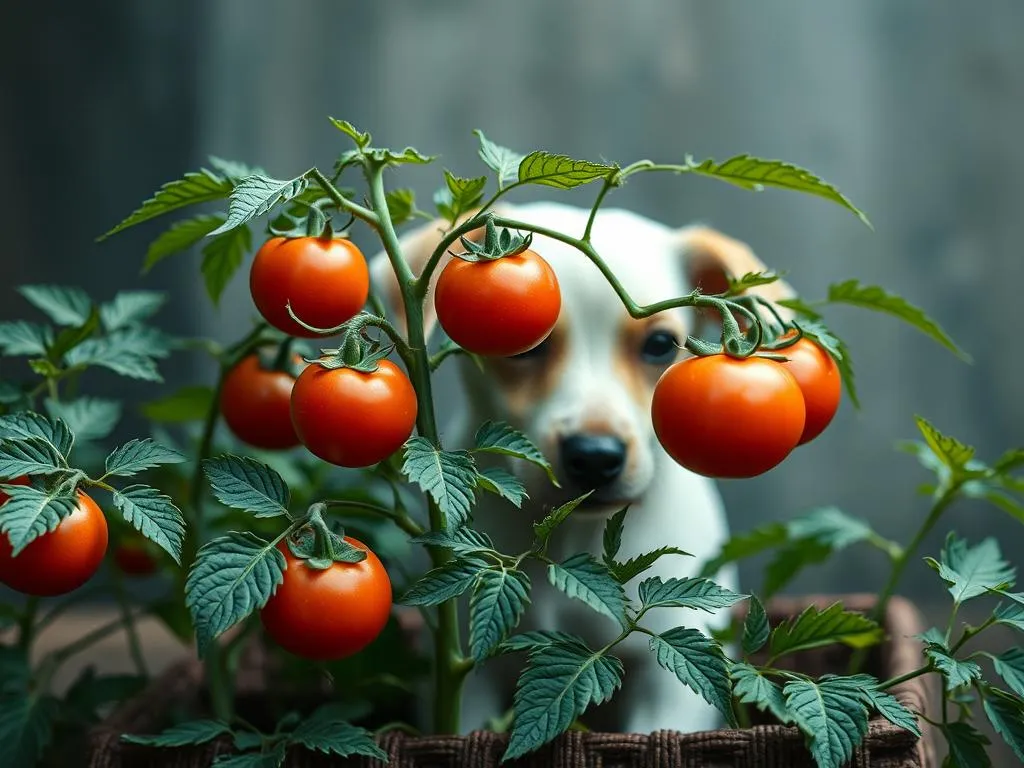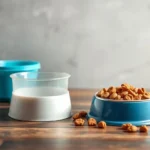
Understanding what we feed our dogs is crucial for their health and well-being. As pet owners, we strive to provide balanced nutrition and avoid potentially harmful foods and plants. One common question that arises is are tomato plants toxic to dogs? This article will delve into dog nutrition, explore the toxicity of tomato plants, and provide guidance on keeping your furry friends safe.
Understanding Dog Nutrition
Basics of Dog Nutrition
A dog’s diet must be well-balanced to support its overall health. Essential nutrients include:
- Proteins: Vital for growth, muscle maintenance, and overall body function. Sources include meat, fish, eggs, and legumes.
- Fats: Provide energy and support healthy skin and coat. Healthy sources include fish oil and flaxseed oil.
- Carbohydrates: Offer energy and aid digestion. Good sources are vegetables and whole grains.
- Vitamins and Minerals: Necessary for various bodily functions. They can be found in fruits, vegetables, and commercial dog food.
The importance of a balanced diet cannot be overstated; it helps maintain optimal body weight, supports immune function, and promotes overall vitality.
Common Nutritional Myths
Several myths surrounding dog nutrition can mislead pet owners:
- Myth: Dogs can thrive solely on a meat diet.
-
Reality: Dogs need a mix of proteins, fats, and carbohydrates for optimum health.
-
Myth: Table scraps are safe for dogs.
- Reality: Many human foods can be harmful to dogs, which is why it’s essential to know what’s safe.
Consulting veterinary advice is crucial for creating a suitable diet tailored to your dog’s needs.
Plants and Foods Harmful to Dogs
Overview of Common Toxic Plants
Certain plants are toxic to dogs, leading to symptoms ranging from mild discomfort to severe health issues. Common toxic plants include:
- Lilies: Highly toxic to cats but can also affect dogs.
- Azalea: Can cause vomiting, diarrhea, and lethargy.
- Sago Palm: Extremely toxic, leading to liver failure.
Recognizing the signs of plant toxicity, such as vomiting, diarrhea, or lethargy, is critical for prompt treatment.
Specific Focus on Tomato Plants
Are Tomato Plants Toxic?
To address the question, are tomato plants toxic to dogs? Yes, they can be. The toxic compounds found in tomato plants, particularly in the leaves and stems, are solanine and tomatine. These compounds can cause gastrointestinal distress in dogs if ingested.
Symptoms of Tomato Plant Toxicity
If a dog ingests parts of a tomato plant, symptoms may include:
- Vomiting
- Diarrhea
- Abdominal pain
- Lethargy
The severity of symptoms largely depends on the amount ingested. Small amounts may lead to mild symptoms, while larger quantities can result in more severe reactions.
Other Parts of the Tomato Plant
Ripe tomatoes are generally safe for dogs in moderation, but other parts of the plant are not. The green parts of the tomato plant (stems, leaves, and unripe tomatoes) contain higher levels of solanine and tomatine, making them hazardous.
For dog owners, the guidelines are clear: avoid allowing dogs to chew on or consume any parts of the tomato plant other than ripe tomatoes.
Safe Nutritional Alternatives to Tomato Plants
Safe Vegetables for Dogs
Fortunately, there are several dog-safe vegetables that offer nutritional benefits:
- Carrots: Great for dental health and low in calories.
- Green beans: High in fiber and low in fat.
- Sweet potatoes: Rich in vitamins and a good source of fiber.
- Pumpkin: Beneficial for digestion and a source of antioxidants.
Introducing new vegetables into your dog’s diet should be done gradually. Start with small amounts to ensure they don’t have any adverse reactions.
Homemade Dog Food Recipes
Creating homemade dog food can be a rewarding way to ensure your dog gets a balanced diet. Here are a couple of simple recipes:
Chicken and Vegetable Stew
- Ingredients:
- 1 pound chicken breast, diced
- 2 carrots, chopped
- 1 cup green beans, chopped
- 1 cup sweet potatoes, diced
-
4 cups low-sodium chicken broth
-
Instructions:
- In a large pot, combine all ingredients.
- Bring to a boil, then reduce heat and simmer for 30 minutes.
- Allow to cool before serving.
Beef and Quinoa Bowl
- Ingredients:
- 1 pound ground beef
- 1 cup quinoa, rinsed
- 2 carrots, diced
- 1 cup peas
-
4 cups water
-
Instructions:
- In a pot, cook the ground beef until browned.
- Add the carrots, peas, quinoa, and water.
- Bring to a boil, reduce heat, and simmer for 20 minutes.
- Cool before serving.
When preparing homemade dog food, it’s essential to ensure the meals are balanced and contain the necessary nutrients.
Preventing Toxicity in Dogs
Tips for Dog Owners
Preventing exposure to toxic plants is vital for dog safety. Here are some tips for dog owners:
- Educate Yourself: Familiarize yourself with plants that are toxic to dogs.
- Create a Safe Environment: Keep hazardous plants out of reach or remove them from your home and yard.
- Supervise Outdoor Time: Always keep an eye on your dog while they explore outdoor spaces.
What to Do in Case of Ingestion
If you suspect your dog has ingested a toxic plant, take the following steps:
- Assess the Situation: Determine what part of the plant was ingested and how much.
- Contact Your Veterinarian: Provide them with details about the plant and symptoms your dog is exhibiting.
- Follow Veterinary Advice: Your vet may recommend bringing your dog in for an evaluation or treatment.
Prompt action can make a significant difference in your dog’s recovery.
Conclusion
Understanding the intricacies of dog nutrition and the potential dangers of certain plants is vital for every dog owner. Are tomato plants toxic to dogs? Yes, they can pose a risk if ingested, particularly the leaves and unripe tomatoes. By educating ourselves on safe and unsafe foods and plants, we can better care for our canine companions.
Always consult with a veterinarian for personalized dietary advice and guidance on keeping your dog healthy and safe.
FAQs
Common Questions About Dog Nutrition
-
Can dogs eat fruits?
Yes, many fruits are safe for dogs, such as apples (without seeds), bananas, and blueberries. -
Is chocolate dangerous for dogs?
Yes, chocolate contains theobromine, which is toxic to dogs and can cause severe health issues.
Questions About Tomato Plants and Dogs
-
What should I do if my dog eats a tomato plant?
Monitor for any signs of distress and contact your veterinarian for advice. -
Are cooked tomatoes safe for dogs?
Yes, small amounts of cooked ripe tomatoes can be safe, but always avoid the green parts of the plant.









